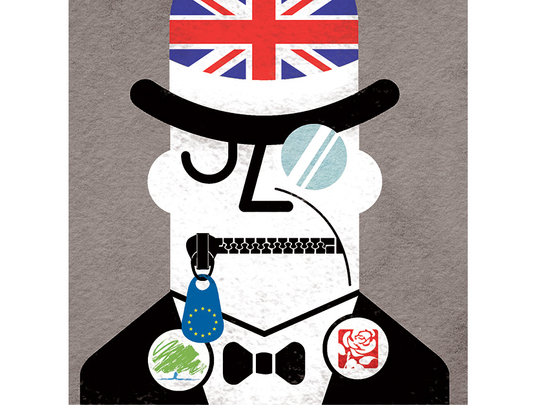
The British election on May 7 is too interesting for the country’s good. Neither the Conservatives nor Labour expect to win a majority of seats in Parliament. Everything will depend on deals struck after the vote - an idea to which other countries are accustomed, but not Britain. Never have the election promises of the two big parties seemed so irrelevant.
Even allowing for this dynamic, the offers of Labour and the Conservatives are weirdly thin in one respect. This was supposed to be an election about Europe. To dent the popularity of the United Kingdom Independence Party and deal with a long-standing rift in his own team, Prime Minister David Cameron has promised that if he is re-elected he will negotiate new terms for the country’s membership in the European Union (EU), then put the result to a stay-or-go referendum.
You may, therefore, expect detailed back-and-forth about what Britain wants from the EU and what its options outside the union would be. This has not happened. Labour calls Brexit unthinkable, without saying why it is unthinkable. And Cameron has not said how the current terms would need to change for him to recommend voting yes in the referendum.
Cameron’s officials have compiled reportson the “balance of competencies” between the EU and national governments, but these are mainly compendiums of opinions and anecdotes, no more than a prologue to what’s required. The government has offered no blueprint — nothing that even suggests a coherent negotiating position. I don’t know whether John Kerr (a former head of the British Diplomatic Service) is right to say that the government buried the reports. There wasn’t much to bury. Better to say the reports appeared without trace.
What then should the Tories be saying? I agree with most of what Janan Ganesh recommends in his Open Europe memo to the prime minister. He’s right, in particular, to note that Britain has no good choices: “There is a very strong argument that the EU is a complacent, hidebound organisation in a stagnant continent in the wrong part of the world and on the wrong side of history. There is a less strong argument for actually leaving it. It is possible to be fervently eurosceptic and reluctantly pro- membership at the same time, for sheer want of better options.”
Sad but true. Britain is a medium-sized country off the coast of Europe. It is no use wishing it were somewhere else.
Granted, Canada is a small country attached to the US and, as I have previously argued, has not suffered unduly. But Ganesh is also right to be cynical about Europe’s response to Brexit, if it happens. Sure, it would be in the EU’s interests to negotiate a friendly divorce of the kind that appeals to British eurosceptics — one that maintains full British access to EU markets and vice versa, a deal like the one Canada has with the US — friendly divorces are generally in the interests of both partners — yet are not so common. If Europe decided to take revenge on its ex-partner, it could inflict real economic damage.
Guided by the principle “more Europe where necessary, less where possible”, Britain could and should argue for more “subsidiarity” — the idea that decisions should be made by national governments unless (as Americans might put it) there is a compelling interest that requires action at the EU level to advance. There is support for this approach in other countries. Europe recognises the notion, but has not applied it as though it matters.
The Treaty of Lisbon, signed in 2007, introduced a “yellow card” procedure: If a third or more of national parliaments declare that a proposal from the European Commission (EC, the EU’s executive arm) violates the principle of subsidiarity, the EC is obliged to pause. That is not good enough: In that case, the plan should be scrapped. A similar procedure should be established for repealing laws already passed.
This change, and others pushing the same way, could go into effect without a new treaty: The EC would be told, thank you for complying voluntarily. This matters because many EU governments are reluctant to start a new round of treaty changes.
Britain would be right, nonetheless, to press for a new treaty, even if with no great expectation of success. Why? My main disagreement with Ganesh concerns his view on the EU’s formal commitment to “ever closer union”. Purging that is important — and doing so requires a new treaty. “The idea of rewriting the commitment to ‘ever closer union’ to something less messianic would make us feel more at ease in the project, perhaps, but it would not make any tangible difference. The EU is integrationist because its members want it to be, not because a legal clause mandates it,” Ganesh wrote.
In the past, the EU has been integrationist for both reasons. Regarding what the members want, I am not sure they are any longer convinced that ever closer union makes sense. One or two may have noticed what the single currency — once justified as a vital step toward ever closer union - has done for their economies, not to mention their domestic politics.
Be that as it may, enshrining perpetual integration in the EU’s constitution has made a tangible difference. It is a principle that is flatly at odds with subsidiarity, and one that instructs the European Court of Justice, supposedly the judicial guarantor of subsidiarity, to give that interest less weight. In practice, the court has given subsidiarity almost no weight. To change that, you have to change the EU’s constitution.
Cameron has promised momentous decisions on an impossibly rapid schedule if he wins next month — and that is as much as he is saying. Labour, for its part, also wants the subject to go away. Let dysfunction and indecision reign. Maybe Britain belongs in Europe after all.
— Washington Post








